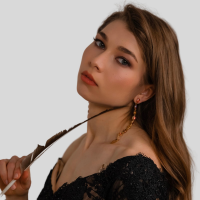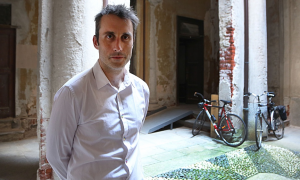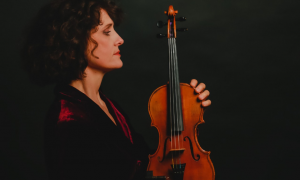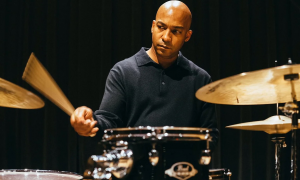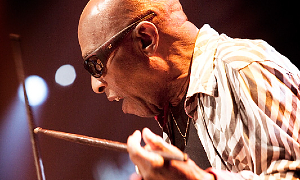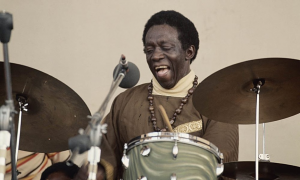Home » Jazz Articles » Interview » Adonis Rose: Following The Score Of Higher Power
Adonis Rose: Following The Score Of Higher Power

As a drummer, I create moods for the band. I sit behind the drum stand and play a very supportive role, creating whatever type of energy is required. If it's something really powerful, fast, or heavy, the drummer really has to be the person to invoke that energy more than anyone else.
—Adonis Rose
The Orchestrator of Moods
The master drummer, composer, producer, artistic director, Adonis Rose seems to have had his mission imprinted in the constellation of stars guiding him throughout his life, reflecting in his encounters, career highlights, and even name and surname initials. A.R. coincides with an AR term in the music industry denoting "Artist & Repertoire representative." Numerous successful projects led by Rose have shown his incredible talent in seeking out the right artists for the right repertoires and events. As an artistic director, he brings the ideas and trajectories that benefit the creatives involved and the world as a whole on a humanitarian level. A path destined from above, a mission undertaken with power, hard work, spiritual strength, and success.Adonis Rose: I believe in a Higher Power, the law of attraction, and I have a lot of faith. I believe in whatever type of energy you put in the Universe is what you get back... One opportunity leads to the next. I always felt I've been in the right place at the right time for things to happen. And those things do not necessarily come up out of positive situations.
Our conversation with Rose went in the inspiring flow of philosophy, life, and music intertwined, giving a testament to the powerful triad: "time—place—energy." He recalled a period of him taking over the New Orleans Jazz Orchestra at a very turbulent time for the organization.
AR: I was tapped to come in and rebuild the organization's reputation, put the band together.
An achievement that opened more doors to him and led to new encounters. Today NOJO became part of JazzAscona festival alongside Tremelo Brass Band, Tulane, New Orleans Youth orchestra. Coming on and off to JazzAscona in the last 10 years, Rose became an inseparable part of this festival, facilitating the musical bridges between Ascona and New Orleans, bringing the leading US musicians to Switzerland, performing himself as a conductor and drummer, granting opportunities to the younger generations hailing from overseas to perform here and learn from the world's greatest, and giving us a chance to connect and have this conversation on the shores of the majestic Lago Maggiore in Ascona.
The list of collaborations Rose's projects involve clearly shows us the aforementioned law of attraction in action. Wynton Marsalis, Dee Dee Bridgewater, Terence Blanchard, Dianne Reeves, Harry Connick, Jr., the list goes on. Great personalities Rose has been working with align with his own greatness as a drummer, composer, artistic director, producer, human being.
AR: There are tons of people along the way who contributed to my path. I do believe that the universe has put them in my path and helped me develop and cultivate my sense of passion and commitment to the arts.
The sense of passion and commitment reflect in Rose's latest projects bringing another triad of "music, meaning, moment" to the forefront of our conversation. These projects appear in his life like movements, or melodic ideas aligned with the score of the "Higher Power" and its key, unveiling hidden elements in the "time-place-energy" pyramid. One of such much needed elements is, for sure, the hard-work.
AR: Sometimes things line up quickly. But generally people have to work really hard to get things they want. And even after you get what you think you want, it still requires the work to maintain it.
He considers himself to be a "workaholic" and owes that to one of his mentors, Wynton Marsalis, who used to say: "Why sleep when you can be creating something?" The student followed in a way the teacher's approach later on. In Rose's view, there is also a supply and demand relationship between energy and the projects requiring such: "it seems like the more I have to do, the more efficiently I work." He also added: "I love the experience of working with young people and being in a position of granting the opportunities." The satisfaction coming from being able to give those opportunities, to create first-time experience for musicians, fuels further projects too.
Accordingly, there should be also an ongoing call for the meaning in artistic endeavours alongside hard-work. Music industry provides us numerous examples of artists becoming successful with one release and then trying to maintain that with the next one.
AR: You are chasing your tail trying to be better than your last project. And I try not to ever do that. I just try to do projects that speak to who I am at a specific moment in time. And to me that's more important than trying to outdo myself on the last project.
As a jazz composer and producer, he tends to create projects that respond to community needs, deal with social issues. In Rose's view "that keeps the music relative to the time." In line with his life philosophy and artistic vision, Rose's latest album, Piece of Mind (Storyville, 2020), for instance, touches on subjects of justice and inequality whilst also showcasing the musical excellence and the greatness of his musical direction. Amidst the bushes of songs that speak mostly about personal relationships, heartbreaks, and other topics with "me, myself, and I" approach, released widely in pop genre, works like Piece of Mind bring so much needed meaning, light, and depth to the current music industry.
AR: I don't think we are constantly chasing behind the bus because we just want a certain amount of the record sales.
Likewise, despite being Grammy-awarded, he mentioned that never made music for awards as a purpose. "Being able to expose people to things... that may need to be fixed," inspiring them "to do something better in life," reflecting on what's happening in the world, are the elements that "keep us driven as artists... I try to do that all the time," And indeed, he does.
His recent jazz ballet project centers around the burning of three black churches in Louisiana in 2019. Music and dance intertwine in a unique synthesis, raising awareness of hatred against sacred places.
AR: These are the projects that keep me driven. Give me something new to look forward to.
Rose's first jazz ballet is now touring the world with 20 dancers and 20 musicians where dance choreography is a combination of ballet, dance theatre, and jazz. The project's partner dance company has never performed with a jazz orchestra on the stage before, having used only pre-recorded music.
AR: Imagine all of the power and sensitivity of the full orchestra coupled with live dance performance. It's all connected and all of that energy flows in the same direction. We have 50 people on stage and everybody is working towards the same goal.
Music, Meaning, Moment.
Another hat Rose wears, while also being the artistic director, composer and producer, is that of a drummer, and one cannot underestimate the importance of a "moment" in this activity as well as the importance of rhythm section, its "meaning" in music.AR: As a drummer, I create moods for the band. I sit behind the drum stand and play a very supportive role, creating whatever type of energy is required. If it's something really powerful, fast, or heavy, the drummer really has to be the person to invoke that energy more than anyone else.
As a master drummer, Rose is the one who makes the inner clock of the music tick. "Hot and steamy like the city of his birth," his playing blends seamlessly with the surrounding music, making the heart of the powerhouse orchestra beat.
AR: We can create moods, we can determine the trajectory of where the song can go, how we orchestrate it. I'd think of myself as being the orchestrator of moods when I'm behind the kit.
Being behind the drums means also being behind the band. In Rose's words that makes all of the music and energy flow forward as opposed to the situations when he is conducting the band and the energy is coming straight directly towards him.
AR: As a conductor in front of the band, I can see, hear, feel everything. I can feel the energy of someone in the band. Being the conductor is a different type of experience but the same type of thing. You help bring the band together, make sure the musicians have continuity, sections have display within the music dynamically.
This activity requires being, again, an orchestrator, but in a different sense.
Reflecting on how music was more of a self-oriented practice in his life before, he recalled modestly: "It was mostly about me: making a living out of music and having fun." Being an artistic director today, he shared, means having "a lot of responsibility" and people depending on him.
AR: You have to be humble and treat people with respect if you are in this position.
Having explored several facets of Rose's career, the conversation brought us back to the initial "time-place-energy" triad and to the overarching principle of "Higher Power" that became its starting point. Rose's recent album "For All We Know" (2024) features a stunningly beautiful song "So Many Stars" written by Sergio Mendes that questions: "So many hearts, so many smiles, so many stars... , which one to choose, which way to go, how can I tell, how will I know." Again, this brought us to the question of destiny and career.
AR: You never know what's gonna happen. I just keep working and doing what I love to do until the next thing comes and I make the decision"—Rose said. "The Creator prepares us for situations that we end up being in. You are already prepared when the opportunity comes. One thing leads to the next, and situations prepare you.
Contrary to the widespread manifestation beliefs, he confessed with a smile:
AR: Ten years ago I did not write: 'I want to be the artistic director of the NOJO, or be the New Orleans culture coordinator for JazzAscona, or be the executive director of the Nocca Foundation, or write a jazz ballet'—I was happy.
Already back then, however, he started his own non-profit organization and jazz orchestra in Dallas. As if seeing with his inner vision which star to follow, Rose was the artistic director of the festival, was managing a large group of musicians, worked as a music teacher, composed music, toured as a drummer when as if "all of a sudden" the things started to turn.
AR: When things line up and more than one thing happens, related to the same type of thing, it's important to be able to recognize where the universe is leading you.
When Rose's mom asked him to come back to New Orleans because she was feeling sick and NOJO asked him to come and take over the organization, he understood that those were the signs to come back: "The universe was pushing me back home." Instead of fighting that energy, he went with it following the score of the Higher Power.
AR: I think that is important: keeping your mind open at all the times. That makes it easier for things to happen. Be positive and stay focused. Be open to the universe and accept the things that come to you. So that when it comes calling you, you are willing to step up and be of service.
Music, meaning, moment. Time, place, energy.
With "Highest Power" being the conductor of this life's orchestra, being its artistic director, its supreme orchestrator that instills the beat and feels every member's input. The energy that makes us choose "which stars to follow" and "which ways to go." Like a healing mantra, the verses of those triads kept running in my head after our inspiring conversation with Rose who called himself: "a musician, a servant to the art, to the music, and to the people who appreciate that."Music, meaning, moment. Time, place, energy. "For All We Know..."
Tags
Interview
Kurt Ellenberger
Adonis Rose
wynton marsalis
Dee Dee Bridgewater
Terence Blanchard
Dianne Reeves
Harry Connick, Jr
Comments
PREVIOUS / NEXT
Adonis Rose Concerts
Support All About Jazz
 All About Jazz has been a pillar of jazz since 1995, championing it as an art form and, more importantly, supporting the musicians who make it. Our enduring commitment has made "AAJ" one of the most culturally important websites of its kind, read by hundreds of thousands of fans, musicians and industry figures every month.
All About Jazz has been a pillar of jazz since 1995, championing it as an art form and, more importantly, supporting the musicians who make it. Our enduring commitment has made "AAJ" one of the most culturally important websites of its kind, read by hundreds of thousands of fans, musicians and industry figures every month.

